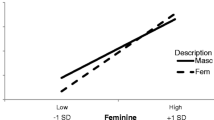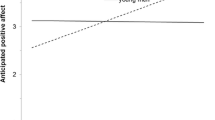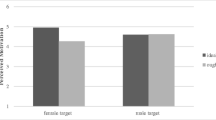Abstract
Male (N=59) and female (N=60) college students were given a written protocol describing a competent, achievement-oriented female stimulus person (SP) with either a masculine or feminine pattern of vocational and avocational interests. Three groups were given a masculine-pattern protocol and one group was given a feminine-pattern one. They were then asked to rate the SP on likability in work and social settings, femininity, and a number of other personal attributes. Two groups given the masculine-pattern protocol were also supplied with the SP's responses to items from a “personality” test answered in a predominantly feminine (Masculine—Feminine SP) or masculine (Masculine-Masculine SP) direction. The remaining groups (Masculine-Neutral and Feminine-Neutral SPs) were given no additional information. In agreement with previous findings, the Masculine-Neutral SP was liked more in social settings than was the Feminine-Neutral one. It was hypothesized and confirmed that the Masculine-Neutral SP would be perceived as similar to the Masculine-Feminine SP in femininity and likability and that both these SPs would be judged to be higher on these characteristics than the Masculine-Masculine. Complex results were obtained from the ratings of other attributes. Overall, they indicated that the Masculine-Feminine SP, in whom femininity was explicitly suggested, received the weakest ratings on a series of achievement-related attributes and the Masculine-Neutral SP the strongest.
Similar content being viewed by others
References
Rosenkrantz, P. S., Vogel, S. R., Bee, H., Broverman, I. K., & Broverman, D. M. Sex-role stereotypes and self-concepts in college students. Journal of Consulting and Clinical Psychology, 1968, 32, 287–295.
Seyfried, B. A., & Hendrick, C. When do opposites attract? When they are opposite in sex and sex-role attitudes. Journal of Personality and Social Psychology, 1973, 25, 15–20.
Shaffer, D. R., & Wegley, C. Success orientation and sex-role congruence as determinants of the attractiveness of competent women. Journal of Personality, 1974, 42, 586–600.
Spence, J. T., & Helmreich, R. Who likes competent women? Competence, sex-role congruence of interests, and subjects' attitudes toward women as determinants of interpersonal attraction. Journal of Applied Social Psychology, 1972, 2, 197–213.
Spence, J. T., Helmreich, R., & Stapp, J. The Personal Attributes Questionnaire: A measure of sex role stereotypes and masculinity-femininity. Journal Supplement Abstract Service Catalog of Selected Documents in Psychology, 1974, 4, 43–44.
Spence, J. T., Helmreich, R., & Stapp, J. Likability, sex-role congruence of interest, and competence: It all depends on how you ask. Journal of Applied Social Psychology (in press).
Author information
Authors and Affiliations
Additional information
This research was supported in part by the National Science Foundation, Grant GS-38144X, Janet T. Spence, Principal Investigator, and by NASA Grant NGR 44-012-224, Robert Helmreich, Principal Investigator.
Rights and permissions
About this article
Cite this article
Kristal, J., Sanders, D., Spence, J.T. et al. Inferences about the femininity of competent women and their implications for likability. Sex Roles 1, 33–40 (1975). https://doi.org/10.1007/BF00287211
Issue Date:
DOI: https://doi.org/10.1007/BF00287211




